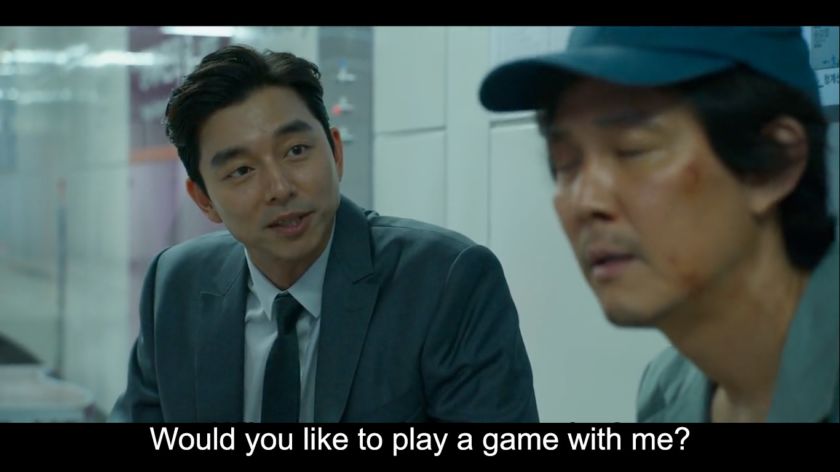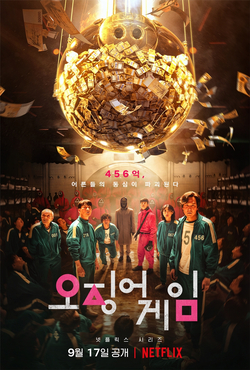-
 Screenshot from Squid Game. Photo credit: Netflix
Screenshot from Squid Game. Photo credit: Netflix
Squid Game is a true hit show. The Netflix-series in which contestants play children’s games with a deadly twist in order to win a huge sum of money has been well watched for weeks and receives praising reviews. What makes the show so popular and what does that say about society?
Red light, green light, playing with marbles or tug of war: who didn’t play these games when they were in elementary school? But what if the loser doesn’t sit on the side-lines and gets shot instead? That is, in a nutshell, the premise of hit show Squid Game on Netflix.
Warning: this article contains spoilers!
In the Korean show, main character Seong Gi-hun, a gambling addict and deeply in debt, joins a mysterious survival game where he can win a hefty sum of money. In total there are 456 contestants, who all deal with money trouble or poverty in their own way. They find out quickly that players who lose the game pay the ultimate price: death. At the end of six different children’s games only one winner remains.
Radboud Reflects recently held a lecture in which cultural scientist Niels Niessen, who specializes in everyday life in the digital age, and psychologist Thijs Verwijmeren, who knows everything about influence, discussed the popularity of the series.
What makes Squid Game so popular?
Niessen: ‘The show is smart, both with content and the way it was shaped, and really immerses viewers. It combines a mysterious and gruesome game with scenes from everyday life. Especially the lightly grotesque and humoristic acting by the main character appeals to the viewers and makes the violence less intense, at least at the start of the show.’
Verwijmeren: ‘The themes of the show are quite heavy: it touches on poverty, freedom of choice and death. But it is the light-hearted way that it is handled, what makes it one the series’ strongest points. Not only the acting, but also the choice of colour in different scenes contributes visually.’
Niessen: ‘Squid Game is also very ‘memeable’: there are many memes (funny pictures, ed.) of the show to be found online. That helps a lot with the popularity.’
There are many movies and shows made with similar genres. Take for example the survival movies of The Hunger Games. Or dystopian shows such as West World or Black Mirror. How do those differ from Squid Game?
Verwijmeren: ‘Squid Game hits closer to reality: the contestants are ordinary people. West World is science fiction, just like The Hunger Games. Black Mirror is more like real life but isn’t about survival. Furthermore, the contestants in Squid Game have some freedom of choice. Their participation isn’t forced on them by some higher power or dictatorship, like in The Hunger Games for example.’
‘You’re constantly thinking along with the main character about the choices he has to make’
Niessen: ‘I mostly compare Squid Game with movies such as The Truman Show or The Matrix. Those encompass the question how the main character can stay human in inhuman conditions. The main character also dabbles in ideas on democracy and capitalism. Squid Game is a lot more gruesome than The Truman Show and the dead are less virtual than in The Matrix. But the idea remains the same: you’re constantly thinking with the main character about the choices he has to make.’
So, choices and freedom of choice. How much actual freedom of choice is there in the show?
Verwijmeren: ‘Even though the contestants can choose to stop whenever they want to, there still isn’t a lot of real freedom of choice. With freedom of choice, it is important to know what you are saying ‘yes’ to, which is something the contestants obviously have no idea about. Furthermore, their disadvantaged position is also of importance: in those situations, people tend to act less rationally and think only about short-term profits. And there is also manipulation and temptation: a lot of money is on the line.’
Where does the show hit close to reality?
Verwijmeren: ‘Some forms of manipulation take place in real life as well. In the fifth game, contestants have to jump on glass plates, but there is a 50 percent chance you fall through and die. At that point, only 16 contestants remain. If you start to calculate your odds of survival, quitting is the most rational choice. But that would mean no-one will get the money and 440 people died for nothing. It is called the sunk costs fallacy: you have already paid a price, so you want to continue as not to lose your investment.’
‘Even though the show handles it gruesomely, it’s still an everyday mechanism. If you bought a ticket to a festival, but you know the weather is going to be awful, you would still go because you don’t want to have wasted your money. It also happens on a much larger scale. Take for example the financial disaster surrounding the Betuwelijn (important cargo railroad near Nijmegen, ed.): in the end a few extra billion had to be pumped into the project because nobody wanted to pull the plug once they started (the project was predicted to cost 1,1 billion euros, but eventually cost 4,7 billion euros, ed.).’
‘Squid Game contains elements that correspond with the way conspiracy theorists think’
Are there more comparisons with real life to be made?
Niessen: ‘For sure. The Matrix has that iconic scene where the main character needs to choose between a blue and a red pill. If he chooses blue, he continues living unknowingly in his everyday apparent reality. If he chooses red, his eyes are opened to the real reality behind everything. This so-called ‘system as a game metaphor’ has become popular with conspiracy theorists. They see themselves as red pillers: people who see the actual reality.’
‘Squid Game also contains elements that correspond with the way conspiracy theorists think, with a similar metaphor where the system (ideologies such as democracy and capitalism, ed.) is seen as a game. For example, the games were created as a form of entertainment for an elite group that stands above society. The theme of an exalted elite group is also reflected in some conspiracy theorists today: they believe in elitist cults, some with a satanistic or paedophile character.
‘To shine light on one more thing: in the show barcode scanners are used, which decide whether a person is allowed to enter a certain room. It’s very similar to the way you need to show a corona pass to enter a building. It’s almost like the creators of Squid Game saw the QR-code coming.’
Do we need to worry about children who watch the show that try to replicate the games, as we have read in various media?
Niessen: ‘Indeed, there has been some moral panic about the show, but I don’t think that is necessary. I do think Squid Game shows the importance of media literacy. We need to keep talking with each other, young or old, about what we see in various media and how those media form the way we look at the world.’




